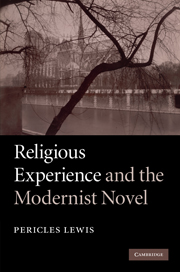Book contents
- Frontmatter
- Contents
- Acknowledgments
- 1 Churchgoing
- 2 God's afterlife
- 3 Henry James and the varieties of religious experience
- 4 Marcel Proust and the elementary forms of religious life
- 5 Franz Kafka and the hermeneutics of suspicion
- 6 Virginia Woolf and the disenchantment of the world
- 7 The burial of the dead
- Notes
- Select bibliography
- Index
4 - Marcel Proust and the elementary forms of religious life
Published online by Cambridge University Press: 26 February 2010
- Frontmatter
- Contents
- Acknowledgments
- 1 Churchgoing
- 2 God's afterlife
- 3 Henry James and the varieties of religious experience
- 4 Marcel Proust and the elementary forms of religious life
- 5 Franz Kafka and the hermeneutics of suspicion
- 6 Virginia Woolf and the disenchantment of the world
- 7 The burial of the dead
- Notes
- Select bibliography
- Index
Summary
Just before relating the incident of the madeleine, which sets in motion the series of memories that compose Remembrance of Things Past (À la recherche du temps perdu [1913–27]), Proust's narrator remarks that before he tasted the madeleine, the memory of his family home in Combray was to him nonexistent, as good as dead. “Dead for ever?” he asks (“Mort à jamais?”). He replies by commenting on an ancient form of religious belief:
I feel that there is much to be said for the Celtic belief that the souls of those we have lost are captive in some inferior being, in an animal, in a plant, in some inanimate thing, and thus effectively lost to us until the day (which to many never comes) when we happen to pass by the tree or to obtain possession of the object which forms their prison. Then they start and tremble, they call us by our name, and as soon as we have recognised their voice the spell is broken. Delivered by us, they have overcome death [“elles ont vaincu la mort”] and return to share our life. And so it is with our own past.
Proust thus establishes an analogy between his own theory of involuntary memory and “primitive” religion. The central element of this analogy is the notion that inferior beings, such as inanimate objects, can contain the souls of the dead or the essence of someone's past life.
- Type
- Chapter
- Information
- Religious Experience and the Modernist Novel , pp. 81 - 110Publisher: Cambridge University PressPrint publication year: 2010
- 1
- Cited by



